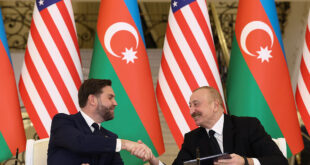 A Pentagon report on China’s military strength deliberately exaggerates figures and is intended to spread the theory of a “China threat”, Beijing’s foreign ministry has said.
A Pentagon report on China’s military strength deliberately exaggerates figures and is intended to spread the theory of a “China threat”, Beijing’s foreign ministry has said.
Â
In a strongly worded rejection of the Pentagon findings, the ministry criticised what it said were the “ulterior motives” behind the report.
Â
The Pentagon study, released on Friday, said China’s military expenditure was well above officially released figures as Beijing looks to project its growing military strength well beyond its borders.
Â
It said China should be more transparent in its military expenditure and ambitions.
Â
The Pentagon report is an annual assessment of China’s military strength presented to congress.
Â
It said new and highly sophisticated Chinese submarines, missiles and unmanned combat aircraft had significantly raised China’s ability to launch pre-emptive strike, and it pointed to China’s recent test of an anti-satellite weapon as a threat to “all space-faring nations”.
Â
In March Beijing announced its military spending would rise by almost a fifth in 2007, although that still puts its total expenditure far behind the US.
Â
The announced increase would take China’s military spending to about bn, the Pentagon report said US intelligence estimates indicated total military-related spending for the year could be up to 5bn.
Â
In contrast the White House has requested a defence budget of 4.1bn for the year starting from October 2007.
Â
That figure that does not include military operations in Iraq and Afghanistan.
Â
Condemning the latest Pentagon report, The Chinese foreign ministry said it “expresses strong dissatisfaction and resolute opposition” to its findings.
Â
“It continues spreading the ‘China threat’ theory, seriously violates the norms of international relations and is a gross interference in China’s internal affairs,” the ministry said.
Â
“Whipping up the ‘China threat’ theory is completely wrong and will be in vain,” it said, condemning the Pentagon for “a serious violation of
the norms of international relations and a gross interference in China’s
internal affairs.”
Â
China, it said, “is a peace-loving country which sticks to a path of peaceful development and adopts a defensive national defence policy,” it said.
Â
In March Marine General Peter Pace, the chairman of the US Joint Chiefs of Staff, paid a four-day visit to China, calling for closer ties between the two countries’ armed forces.
Â
“When you get to know each other and know how each other thinks, you build trust and confidence,” Pace said, adding that China was “a nation that deserves respect”.
Â
The Pentagon report came at the end of a week which saw high-level trade talks between the US and China end without agreement on key disputes, particularly over US charges that China is not moving fast enough on promised reforms.
Â
Members of the US congress are planning to introduce legislation in the coming weeks to punish China for policies they say keep the value of its currency artificially low.
Â
That, they argue, has made Chinese good unfairly cheap, creating a record US trade deficit with China and causing the loss of millions of American jobs.
Â
 Eurasia Press & News
Eurasia Press & News



